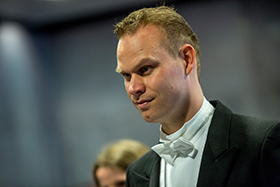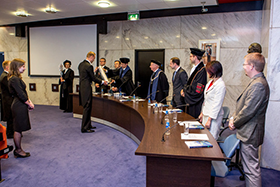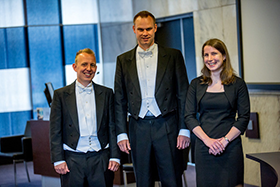PhD Defence: Demystifying Visionary Leadership
 How do leaders effectively communicate their vision? Merlijn Venus clarifies part of the mystery surrounding visionary leadership – and what makes vision communication effective – in his PhD thesis entitled <link doctoral-programme phd-in-management phd-projects detail>Demystifying Visionary Leadership: In Search of the Essence of Effective Vision Communication. His research shows that effectively communicating a business vision depends on the ability of leaders to convey their message ‘emotionally’– in other words, to communicate their vision with their emotions.
How do leaders effectively communicate their vision? Merlijn Venus clarifies part of the mystery surrounding visionary leadership – and what makes vision communication effective – in his PhD thesis entitled <link doctoral-programme phd-in-management phd-projects detail>Demystifying Visionary Leadership: In Search of the Essence of Effective Vision Communication. His research shows that effectively communicating a business vision depends on the ability of leaders to convey their message ‘emotionally’– in other words, to communicate their vision with their emotions.
Venus found leaders can use emotional expressions to align followers’ motivational lenses with their own vision and effectively communicate it. By doing so, leaders can make their followers more receptive, and hence more likely to act on the communicated vision.
What’s more, the vision of the leader was identified as an important vehicle for motivating change. Venus investigated what makes it so effective. He argues that visionary communication will motivate employees to contribute to the successful realisation of change by assuring employees that despite objective change, the key features that define ‘who we are’ as an organisation remain unchanged.
Effective visions of change, therefore, emphasise not only what is going to change but also – and more importantly – what is not going to change. Such visions of change motivate followers to accept the intended changes because they cause them to believe that the future organisation naturally evolves from the present, and that defining features of their organisation will remain visible in the future.
 Merlijn Venus’s dissertation was defended on Thursday 13 June. His supervisor was <link people daan-van-knippenberg>Daan van Knippenberg, Professor of Organisational Behaviour and his co-supervisor was <link people daan-stam>Daan Stam, Assistant Professor of Innovation (both from Erasmus University Rotterdam). Other members of the Doctoral Committee were Dr <link people dirk-van-dierendonck>Dirk van Dierendonck, Dr <link people steffen-giessner>Steffen E. Giessner (both from Erasmus University Rotterdam) and Dr Russell E. Johnson (Michigan State University).
Merlijn Venus’s dissertation was defended on Thursday 13 June. His supervisor was <link people daan-van-knippenberg>Daan van Knippenberg, Professor of Organisational Behaviour and his co-supervisor was <link people daan-stam>Daan Stam, Assistant Professor of Innovation (both from Erasmus University Rotterdam). Other members of the Doctoral Committee were Dr <link people dirk-van-dierendonck>Dirk van Dierendonck, Dr <link people steffen-giessner>Steffen E. Giessner (both from Erasmus University Rotterdam) and Dr Russell E. Johnson (Michigan State University).
About Merlijn Venus
Merlijn Venus (1983, the Netherlands) obtained his MSc degree in Social and Organisational Psychology from Leiden University in 2007 and his MPhil (research master) degree in Management from the Erasmus University Rotterdam in 2009 – both cum laude. In the same year, he started his PhD project in the Department of Organisation and Personnel Management at RSM. In his dissertation, he investigates which factors contribute to and which processes underlie effective leader vision communication. As part of his PhD project, he spent four months as a visiting scholar at Michigan State University. Merlijn’s work has appeared in the Journal of Applied Psychology and is forthcoming in Organizational Behavior and Human Decision Processes.
Abstract of Demystifying Visionary Leadership: In search of the essence of effective vision communication
Vision communication has been heralded as the most defining aspect of outstanding leadership, yet what makes for effective vision communication has eluded leadership scholars so far. Indeed, while vision communication is the only leader behaviour that is specified in all influential leadership theories, it remains unclear which elements of leader vision and how these elements are conducive to the mobilisation of followers toward action. Accordingly, the goal of the current dissertation was to clarify part of the mystery surrounding these issues.
 In this dissertation Venus highlights two ways by which vision communication can provide followers with a viable basis for action and motivation. The first way involves the use of emotional displays by leaders during vision communication. Specifically, he shows that leader emotional displays provide useful for leaders by impacting the motivational lens through which followers interpret and respond to the leader’s vision. The second way involves the assurance of collective continuity. Specifically, he shows that leaders can effectively motivate followers to help realising intended change by communicating a vision which assures them that – despite objective change – the most defining features of the collective will remain unchanged. This dissertation concludes by reflecting on these results from the view that regards leadership as the management of meaning.
In this dissertation Venus highlights two ways by which vision communication can provide followers with a viable basis for action and motivation. The first way involves the use of emotional displays by leaders during vision communication. Specifically, he shows that leader emotional displays provide useful for leaders by impacting the motivational lens through which followers interpret and respond to the leader’s vision. The second way involves the assurance of collective continuity. Specifically, he shows that leaders can effectively motivate followers to help realising intended change by communicating a vision which assures them that – despite objective change – the most defining features of the collective will remain unchanged. This dissertation concludes by reflecting on these results from the view that regards leadership as the management of meaning.
- <link doctoral-programme phd-in-management phd-projects detail>Download Merlijn's dissertation
- View photos of his defence
Photos: Chris Gorzeman / Capital Images


